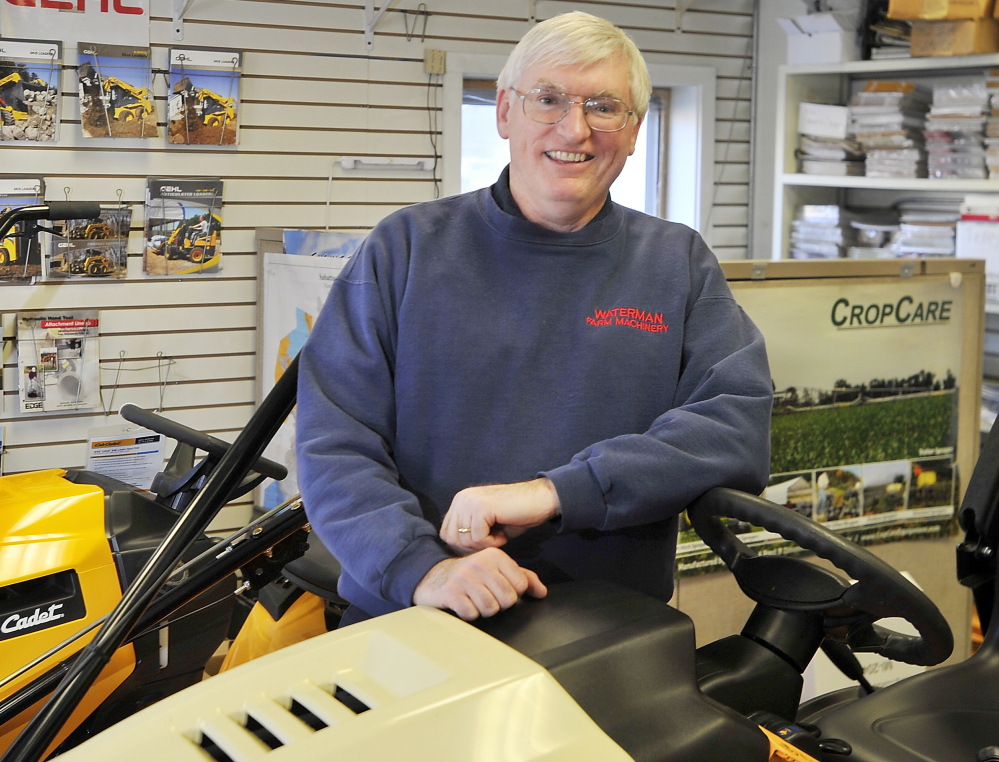When Waterman Farm Machinery Co. was founded in 1956, agriculture in Maine and Sabattus, where the farm implements company and dairy farm is located, was decidedly different than today.
“Sabattus, back then, had probably 30 dairy herds in town,” said Bob Waterman Jr., who now runs the family business. “Now we’re down to one – mine.”
Waterman said his equipment business, which employs 15 people and takes in about $4 million in revenue a year, is also being transformed as it adapts to changes in Maine’s agricultural landscape. There are more weekend gardeners, more small-scale farmers tapping into the farm-to-table movement and also younger farmers, an echo of the 1970s back-to-the-land movement.
Waterman started working for the business full time after graduating from the University of Maine in 1978 with a degree in elementary education.
Q. Is your degree relevant to your work today?
A. I teach my customers to buy from me and I tell them I can do that at an elementary level.
Q. How has your business changed since your father and uncle started it?
A. The equipment has changed – it’s more sophisticated. Back then it was all plows and harrows and mowing machines and that kind of thing. We still sell a ton of loaders, but it’s for a homeowner who might have two or three acres. There are some weekend gardeners who we’re selling tillers and planters and things like that to. We used to have a lot of customers who came here with (manure) on their boots, and we don’t get many of those now. We have white collar people in here spending money. But I believe everybody should have a tractor.
Q. Is there more small-scale farming now?
A. There’s a ton of little farms, and they’re being recorded as a farm but some might not consider them a farm. They might have only a goat or two, but they all need a tractor. There’s a definite move back (to the land) and people are trying to be more self-sufficient and know where their food is coming from.
Q. How is the equipment different?
A. They all have a standard three-point hitch on the back to make it easy to grab an implement and there’s more electronics, for ease of control – nice and easy to operate. We did sell some 200-horsepower or 300-horsepower tractors, but the biggest one lately is a 120-horsepower, with a nice cab and air conditioning and heat. People are in there a lot and they want it comfortable. The buyer for that probably has 150 head (of cattle) and 300 or so acres.
Q. Most cars these days have computers that let mechanics diagnose problems. Is it the same with farm equipment?
A. On some of the new tractors, we need a laptop to go into the field and service it. The old days of just needing a lever and a nut and bolt were better. I miss those days.
Q. Do you buy and refurbish a lot of used machinery?
A. We sell a lot of used equipment. They (buyers) might not be full-time farmers, it might be a weekend farmer who is buying a tractor for $12,000 instead of $30,000.
Q. What kind of farming are people getting into?
A. A lot of people plant just a few trees for fruit and it doesn’t take a lot of garden to get a lot of vegetables out of. Beef is on the rise, too. Beef is easier, you don’t have to milk them – you feed them and get the meat so you don’t have as much to do.
Q. Are you seeing younger farmers getting into the field, so to speak?
A. For a long time the farmers were getting older and older, but now there are young people coming in and doing their thing and their families are into it, too.
Send questions/comments to the editors.




Success. Please wait for the page to reload. If the page does not reload within 5 seconds, please refresh the page.
Enter your email and password to access comments.
Hi, to comment on stories you must . This profile is in addition to your subscription and website login.
Already have a commenting profile? .
Invalid username/password.
Please check your email to confirm and complete your registration.
Only subscribers are eligible to post comments. Please subscribe or login first for digital access. Here’s why.
Use the form below to reset your password. When you've submitted your account email, we will send an email with a reset code.